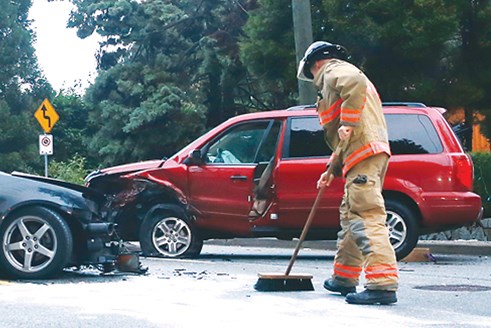The usual argument over speed limits has been sent into a roiling fever with the release of a UBC report that indicates fatalities have sharply increased on our rural roads.
The report, authored by professors Gord Lovegrove and Jeff Brubacher, notes that a 10 per cent increase in the speed limit on certain roads has resulted in a 20 per cent increase in crashes, and a 100 per cent increase in fatalities.
Of course, there are holes to be picked at in the report, which doesn’t factor in weather conditions, increasing truck traffic, or distracted driving. There are still people who wish to make the argument that driving at 120 kilometres per hour on a clear, dry day on the Coquihalla isn’t crazy, and that perhaps we need variable speed corridors that change with the weather and seasons.
Be that as it may, I’m less concerned about how we’re going to handle the speed limit question, and more worried about what the increase in collisions and fatalities really means. Ladies and gentlemen, are we all just too dumb to drive?
Now, don’t take offense, as I’m including myself in this pool. When I received a driving licence in the early 1990s, the process was fairly straightforward. First, I passed a learner’s test which a lightly trained ape could have managed (What does a stop sign mean? Etc.). Then I went out with my dad a few times on the road. After a bit of practice/being yelled at, I popped back in to my local licensing office, where an examiner took me out on a short loop through town, making sure I was able to parallel park and didn’t do burnouts while passing elementary schools. Success!
Of course, my parents were a little bit more thorough than that, and also sent me to Young Drivers of Canada, a training program that taught me a few tricks I still use today. (Example, always watch the front tire of a car you’re passing as the first clue that it might start moving into your lane.) Even so, looking back, it was relatively easy for me to get my licence. And, if I wished, tomorrow I could go out and order an 800 horsepower Challenger Hellcat Redeye and go ripping around town until the police took my toys away.
Today, it’s a bit harder for kids to get their driver licences, and with increased insurance rates, no wonder it’s less of a priority. But what about those of us who are already armed and (probably) dangerous? The problem isn’t only that raising traveling speeds on roads increases the amount of kinetic energy in a crash, it’s that speed limits must be set to the lowest common denominator, and maybe that lowest common denominator is just too low.
A few weeks ago, I was driving around in a new AMG Mercedes at around 280 km/h. It was pretty relaxing. I thought about turning on the massaging seat functions.
Of course, I was on a racetrack at the time, an area built to handle this kind of speed. There were other cars on the track with me, but I didn’t have to worry about them as they all had a certain level of skill.
When I go out on the highways with my family, I am not concerned if the person driving past me is going 105km/h in a 100km/h zone or 115km/h. Outliers who drive at lunatic speeds are always going to be a problem, but they make themselves pretty easy to spot, and our impound laws are already pretty heavy-handed.
But for the bulk of traffic, I’m more concerned with how much training you’ve received, and how well you’re paying attention. The latter is becoming a bigger problem day-by-day in our society, but the former doesn’t seem to be something anyone considers. Why are we able to get a licence in our youth, and then just have it assumed that we continue to develop as a driver, learning only good habits?
What percentage of people on our roads would pass the current BC licensing test today, if forced to take one? And what percentage would pass a more rigorous European or UK test? I’d say the answer would be sobering.
Happily, sort of, ICBC seems poised to come and raid the pocketbooks of us good drivers yet again, because of the damage caused by the unskilled or incompetent. I say happily, because I think there’s an opportunity here.
There’s always been talk of the idea of a super-license, an advanced driver training program that’d let you drive faster than everyone else on the road. For various reasons, I don’t think that’ll work: two-tier speeds on the road seems like a bad idea, let alone how you’d police it.
However, a driver who puts time, energy, and perhaps money into making sure they were properly trained to handle emergency situations should be rewarded. Maybe instead of always reaching for the stick or the leash, our provincial road safety and insurance organizations should try a carrot instead.
Get yourself re-certified, or go through an approved driver re-training centre, and get a break on insuring your car. I’m not saying such should be required, but that anyone who is willing to improve their driving ability should be rewarded, as they aren’t just protecting themselves, they’re making everyone else on the road that much safer.
So, let people argue over whether speed limits need to stay high, go back to where they were, or fall even further. It’s not the limits alone that are the problem. We all need to raise the bar a little.
Brendan McAleer is a freelance writer and automotive enthusiast. If you have a suggestion for a column, or would be interested in having your car club featured, please contact him at [email protected]. Follow Brendan on Twitter: @brendan_mcaleer.



